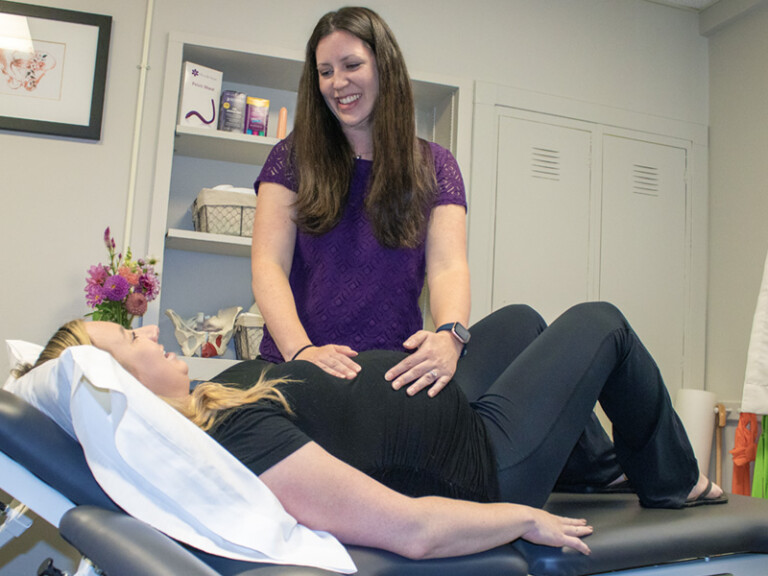March is National Colorectal Cancer Awareness Month!

If you think you have heard much about colorectal cancer diagnoses in the news lately, especially among younger adults, you would be correct! This cancer is highly preventable through screenings and highly treatable when caught early. Dr. Calvin Han, a hematologist and oncologist, as well as the colorectal cancer site leader at Meadville Medical Center’s Yolanda G. Barco Oncology Institute, provides some essential information about the disease, and what he would like the public to know about colorectal cancer.
What are the known causes of colorectal cancer?
There are multiple factors that increase the risk of developing colorectal cancer. The risk increases with age, with most cases occurring over the age of 50 years old. Family history of colorectal cancer also increases the risk as do certain lifestyle factors. This includes a diet that is high in red or processed meats, high fat and low fiber, and low in fruits and vegetables. Smoking, excessive alcohol consumption, and obesity can also increase the risk.
What basic facts about colorectal cancer should the public keep in mind?
Worldwide, colorectal cancer is the third most common cancer and the second leading cause of cancer-related deaths. By adopting a healthy lifestyle, avoiding risk factors, and implementing early detection through screening, we can reduce the impact of colorectal cancer. A colonoscopy is an effective screening method and early diagnosis can often lead to a complete cure.
Are there different types of colorectal cancers?
The majority of colorectal cancers are adenocarcinomas (cancer that begins in the cells of the lining of internal organs). However, there are less common types, which include carcinoid tumors, lymphomas, gastrointestinal stromal tumors, leiomyosarcomas, and melanomas.
It is recommended to start having routine screenings for colorectal cancer starting at age 45, or even earlier if you are at high risk. How does one know if they fall in the “high risk” category?
People that fall under high risk have:
- a strong family history of colorectal cancer of certain types of polyps
- a personal history of colorectal cancer or certain types of polyps
- a history of inflammatory bowel disease
- a family history of a hereditary colorectal cancer syndrome such as Lynch syndrome or familial adenomatous polyposis (FAP)
- a history of radiation to the abdomen or pelvic area to treat a previous cancer
You mentioned that colorectal cancer in the third most common cancer in the world. It is also the deadliest for men under 50 and the second deadliest for women under 50. On top of that, it is one of two cancers highly preventable through screening (the other being cervical cancer)!
So, why does it seem are so many younger people being diagnosed, and why does a highly preventable cancer seem to take the life of so many?
Since the 1990s, the rate of colorectal cancer has been consistently on the rise among adults younger than 50, but nobody knows for sure what is causing the rise in colon cancer diagnosis. Sedentary lifestyle, overweight, smoking, heavy alcohol use and diet is felt to be playing a role. Although we have made significant progress in implementing screening strategies for colorectal cancer, we still have a long way to go. That is why it is so important that the public is aware of the importance of getting their screening colonoscopies.
What kind of treatments are available for colorectal cancer?
Treatment depends on many factors including the stage of the cancer. Treatment may include surgery, chemotherapy, radiation therapy, immunotherapy, and targeted therapy. Once the diagnosis of colorectal cancer is made, it is important to meet with your oncology team to formulate the best treatment plan for the individual.
What is the likelihood that colorectal cancer will return after someone has already been treated?
Once you are diagnosed with colorectal cancer and successfully treated, there are many factors that impact the likelihood that the cancer will return. This includes the location of primary tumor, number of lymph nodes involved, depth of invasion, presence of nerve or blood vessel invasion, perforated tumor, positive surgical margins, and poorly differentiated histology.
You are the colorectal cancer site leader at the Yolanda G. Barco Oncology Institute (YGBOI). What made you interested in specializing in this type of cancer?
Since I was a medical student, I have always had an affinity for the digestive system. So much so that I was strongly considering specializing in gastroenterology at one point in my career. However, I found my true calling and it was to be an oncologist. I still had a special interest in the digestive system though, which led to a special interest in caring for patients with colorectal cancer.
How do you consult with other specialists at MMC to help cancer patients during treatment and recovery? For example, GI providers, dietitians, pelvic rehab therapists, etc.
Our focus and goal for all our patients at YGBOI is to give the best care possible. To do so, we work closely with all the disciplines, which include the medical oncologists, radiation oncologists, dieticians, gastroenterologists, surgeons, and physical therapists. We have great communication between the different specialties, and that really helps in the treatment and recovery process.
What progress have you seen in treatment and prevention since you have been at YGBOI? What do you hope to see in 5 or 10 years from now in how colorectal cancer is prevented and treated?
I have been here at YGBOI for approximately 14 years. During that time, I have been able to witness significant progress made in how we are able to manage colorectal cancer. There have been many breakthroughs in the drug treatments available. This has translated to improving the success rate of cure as well as improving survival in individuals with advanced colorectal cancer. We need to continue to build on that with further research leading to newer and more effective drugs.
In the future, through education of the public, we can lower the impact of colorectal cancer. We can achieve this by lifestyle changes, avoiding risk factors and getting screening colonoscopies in a timely manner.
Colorectal Cancer Treatment Resources
The American Cancer Society and Colorectal Cancer Alliance developed the website, YourColonIs45.org specifically to raise awareness and present facts about the importance of colon cancer screenings starting at age 45. More information about gastroenterology services, including colonoscopies, and cancer treatment services at Meadville Medical Center, can be found at the following links:
Gastroenterology: https://www.mmchs.org/services/gastroenterology/
Cancer Treatment/Oncology: https://www.mmchs.org/services/cancer-treatment/


